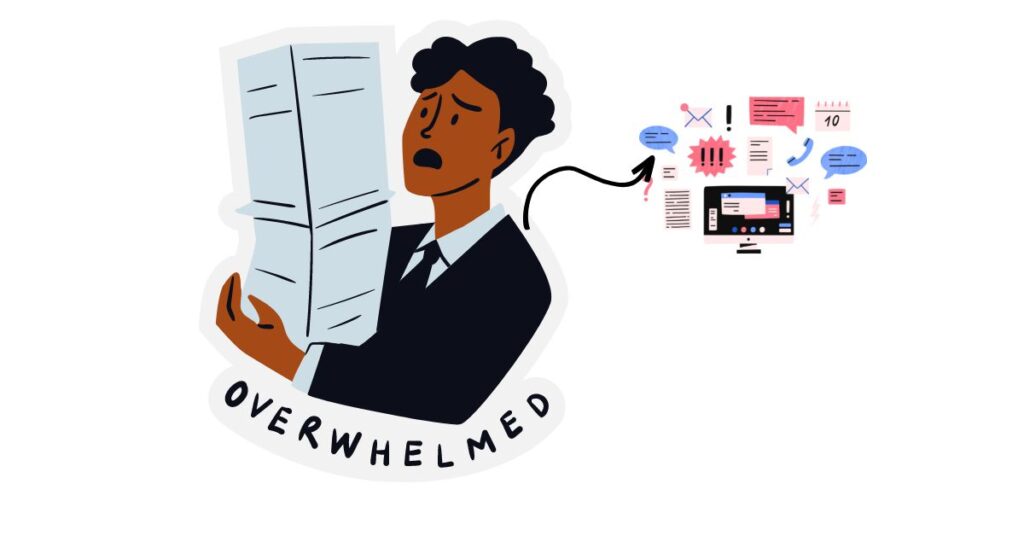Are you feeling overwhelmed and ready to throw in the towel? If so, you’re not alone. Millions of people around the world are facing challenges both personally and professionally and struggling to find a sense of peace in the chaos. The world has changed, and it is easier to be frustrated than ever before. If you are feeling like you cannot take the pain and the struggle anymore, you have come to the right place. This article will show you exactly what do to when frustrated to change the situation in your favor and be in control once again.
If you want to regain control of your stress levels and get back on track, this article is for you. Here, you’ll learn practical and achievable ways to handle frustrating situations, take an honest look at the cause of your frustration, and find long-term solutions that give you the mental clarity to rethink and re-energize. You’ll also discover how to recognize when it’s time to take a break, make changes that foster a healthier mindset, and learn to prioritize yourself. I will provide you with the knowledge and tools you need to tackle tough times, maintain balance, and look forward to a more positive future.
Without further ado, the following are things to do when frustrated and about to lose your mind.
1. Take a timeout
Taking a break when you are frustrated can help you refocus and make better and more educated decisions. You can easily take a few minutes away from the problem. After walking away, you can then focus your mind on activities that relax you and clear your mind from frustrations. For example, taking a walk, meditating, listening to your favorite music, or whatever activity helps you relax and clear your mind when fighting frustrations.
Once you have taken time away, you can come back to the problem with a refreshed outlook, which will allow you to better analyze the situation and find the best solution. Taking a break can also help you gain insight into the cause of the frustration and work toward addressing it in the future.
2. Think before you speak
When you are feeling frustrated, it is very important to pause and think before you speak. Being frustrated means that you are no longer thinking at optimal levels. Frustrations also come with negative emotions and energy that can cause you to say something you will regret later. To manage your frustrations especially when you are losing control, it is important to not speak until you are in harmony with your emotions. Words can hurt when directed in the wrong way. So, make sure that you are fully aware of what you are about to say before saying it. Because you cannot take it back.
Instead of jumping to conclusions, take a few moments to think through the situation and consider the potential consequences of your words before you actually say them out loud. This will help you avoid saying something rash or hurtful and ensure that you are using your words in a mindful and respectful way. Just because you are frustrated, it does not mean you should let your emotions get the best of you.
3. Identify the problem and the solution
The first thing to do when frustrated is to know the main cause of your frustrations. In this article, I have included possible causes of frustration. See, if your frustrations originated from one or more of these causes.
Once you have clearly identified the problem, the second thing to do when frustrated is to start developing a solution. This could involve finding ways to resolve the issue in the short-term, or by making changes to your lifestyle that will help address the problem in the long term. Finally, once you have identified both the problem and the solution, you can then take the necessary steps to put the solution into action and begin to feel relief from frustration.
4. Try to see the other party’s point of view
Just because you are frustrated, doesn’t mean you are right. Maybe you are wrong about a particular situation. But because you are stuck with your own eagerness and stubbornness, you might not be willing to compromise or give others a chance to express their side of the story.
You cannot be right all the time and surely you are not the smartest person in the world. If you are frustrated due to a particular issue/problem, try to seek the meaning of these frustrations and give others a chance to tell you how they see it. It is always important to find common ground during the problem-solving phase. But a common ground can be reached only when each party is given a chance to express themselves and their input is welcomed and considered.
5. Take a deep breath
Taking a deep breath can help you when you are frustrated by slowing you down and resetting your body. When we take a deep breath, our heart rate naturally slows, allowing more oxygen to enter our bodies. This helps us to step back from the situation, regain perspective, and think more clearly. By taking a deep breath and pausing, we can make a conscious choice to respond calmly and effectively, instead of letting our emotions take control.
So, what you should do when frustrated is to take a deep breath and continue to breathe naturally. The more oxygen you get into your body, the calmer you will become.
6. Don’t hold a grudge
Holding a grudge is an instinctive reaction when we are frustrated, but it can often make matters worse. The best way to avoid grudges is to understand your feelings and how they affect you and the environment around you. Then, focus more energy and attention on the solution instead of the problem. Instead of holding grudges against someone, you should communicate your feelings to them and forgive them.
I usually tell people that forgiveness is the strongest indicator of powerful men and women. If you feel frustrated and lose your mind, first understand your feelings and spend more time finding answers. Then let it go. Choosing to let go of your negative energy toward someone and forgiving them is a remarkable step toward greatness.
7. Express your concerns only when you are calm
Telling others how we feel is often the first thing that comes to mind when we are frustrated. The truth is that when you are frustrated is not the best time to tell others how you feel or try to get your point of view across.
If you are frustrated, focus your attention on things that keep you calm. Maybe you need to take a minute or two to digest the issues. You can also take a walk, or simply choose to not say anything. You can then express your concerns when you are calm. This simple strategy will prevent you from causing further damage or escalating conflicts.
8. Get some exercise.
Exercising has the potential to reduce stress and anxiety, improve mood, and help to refocus the mind. Exercising can also give a sense of accomplishment, as individuals are able to set and meet goals.
Additionally, physical activities like running, walking, swimming, and biking can be great for connecting with nature or your own environment. It can also be a great distraction, allowing the mind to focus on something other than the source of frustration while the body expends energy. Exercise can also improve self-confidence since it can be a great way to challenge oneself and push yourself to new limits. Lastly, exercising can help to improve sleep, which is important for managing stress.
What are the causes of frustration?
Although there are many causes of frustration, the following are the top reasons you might feel frustrated and how you can cope with negative energy.
1. Limited financial resources
Being low on cash brings all negative thoughts and dark moments in your life. The idea that you could lose your home, go hungry, take your kids out of school, and probably become homeless is overwhelming. When you are frustrated and about to lose your mind over these issues, it is important that you take proper steps moving forward.
Instead of getting frustrated about money, for example, learn about money, start saving, live below your means, and invest as much as you can. These changes in financial habits will lower your frustration.
2. Too much work
Working too much is a major cause of frustration. Millions of people are working two to three jobs at the same time. On top of that, they have to take care of their families. You can safely say that working too much also comes with physical and mental fatigue which increases your frustration. If you are frustrated due to working too much, either change jobs or adjust your lifestyle so that you can work less. Your life matters more than anything.
3. Lack of control or autonomy
The lack of being in control of your life and the environment around you always comes with the pressure to do what you are told. You can do what you want until it aligns with what someone else wants. It makes you feel like someone else is always in control of your life. To solve this frustrating issue, walk away if you can. Change your environment and go where your voice can be heard. Go to a place where you mean something and your contribution matters.
4. Lack of recognition
Have you been doing all the work without anyone noticing? In today’s world, everyone wants to take credit for the things they did not do. Those in charge of recognizing hard-working individuals are not paying attention. If you are stressed out due to an unfavorable environment, take action. Bring the situations to be people who can help you either inside the organization or outside of it. There is always someone who is willing to do the right thing and seeking help is an important step in changing your life.
5. Unclear expectations
Not knowing what to expect or what the future holds, can be intimidating and mentally challenging to handle. If you are frustrated and losing your mind due to unclear expectations, start practicing optimistic mentality habits. Start thinking positively about future events in your life and stay positive whenever you can. Also, do your homework to make sure that even if things don’t work out, it will only be due to conditions outside of your control.
6. Unrealistic deadlines
Tight deadlines lead to much frustration. You can easily lose your mind simply because you are working on a tight schedule. Not only that you have to work double in a short period of time, but you also have to deliver the same quality in the same timeframe. If you are in control of the situation, set a deadline based on conditions in place and facts instead of emotions and feelings.
7. Poor delegation of tasks
Tasks that are not properly delegated lead to frustrations, mental fatigue, conflicts, and toxic environments. If you are in a position of delegating tasks, assign them based on each person’s ability to get it done and areas of interest. In case you are frustrated because you were assigned a task you are not capable of doing, bring it up to your supervisor. There is always a common ground about every issue. Finding answers is always a better alternative to doing something you don’t like.
8. A sense of powerlessness
Having no power makes you feel like you are useless. This in turn makes you frustrated all the time and sometimes you can feel like you are losing your mind. Leaving such an environment is always the best way to cope with the situation. But, if you can resolve the issue and restore your dignity without leaving, please do so. But, under no circumstances should you stay in environments that make you feel small, unimportant, and unappreciated without doing anything to change it.
9. Unhelpful or unsupportive colleagues
Being surrounded by people who don’t care about you, or your success is frustrating. Instead of helping you some people around you might gossip about how you are about to fail or how you are struggling.
You can easily bring up the issue and simply tell the person in charge such as a supervisor, a manager, etc. If nothing is done, leave or change the environment. If you are frustrated due to the lack of support from family members, friends, etc., you can still address the issue. Just do something.
10. Unresolved conflicts or disputes
Conflicts are some of the biggest causes of frustration. Unsolved conflicts, however, cause more harm than good. For example, if you were wronged and your superior did not do anything, this would cause more harm than the wrongdoing itself.
The bottom line
When you find yourself feeling overwhelmed and frustrated, it’s important to take a breath and remember that you have the power to take control of your emotions and handle the situation. It’s important to take a step back and figure out what the issue is and take the necessary steps to resolve it.
This may involve talking it out with someone else, getting away from the situation, or even seeking professional help. You can do it, and you will be better after taking action. So don’t be afraid to recognize when you need help and seek it. You are stronger and more capable than you think, and the sooner you get help, the better you’ll be. Remember: don’t give up on yourself.









